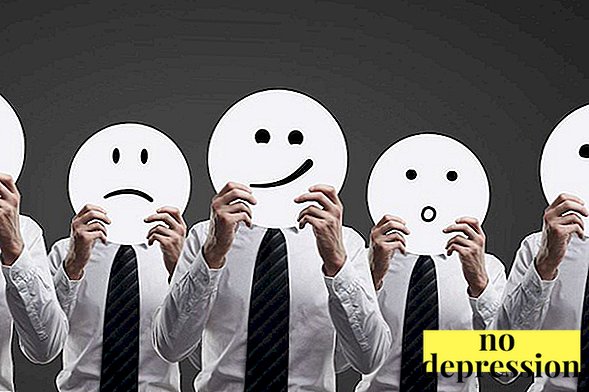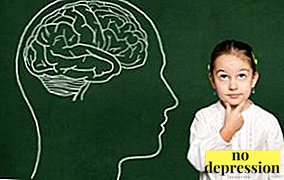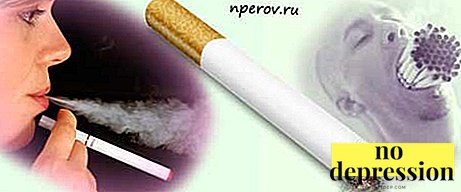In a broad sense, endogenous depression is a type of mental disorder that may occur without obvious reasons or under the influence of mood swings of various etiologies.
Such conditions can provoke serious consequences and must necessarily be adjusted using special techniques. It is possible to eliminate complications by timely prevention of endogenous depression.
What it is?
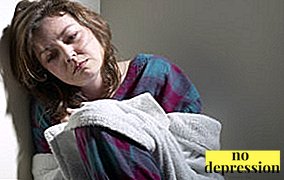
Endogenous depression is a state of the human psyche, accompanied by a sense of uselessness, depressed mood and pessimism.
The most prone to these types of mental disorders are women.
The development of depression is directly related to feeling of anguish. This factor is a distinctive feature of the mental disorder of this form.
Special features endogenous depression:
- The feeling of sadness can manifest itself in various forms (from waiting for sad events to a nervous breakdown, accompanied by stupor and stupor).
- The manifestation of endogenous depression does not depend on external factors (the symptoms of the pathological condition manifest without obvious reasons).
- Endogenous depression is often called "melancholic" or "melancholy."
- In psychotherapeutic practice, endogenous depression is subdivided into several types (inhibited, dreary, anxious, anesthetic, adynamic and dysphoric form).
What is endogenous depression? The psychotherapist explains:
Causes

The main cause of endogenous depression is lack of norepinephrine, serotonin and dopamine hormones.
At risk are people with a genetic predisposition and with certain traits.
In the presence of such factors, sad mood occurs even with a favorable atmosphere.
The situation is aggravated and numerous nuances increase the severity of depression (for example, improper diet, abuse of bad habits, etc.).
Provoke The following factors can cause endogenous depression:
- genetic predisposition;
- the progression of somatic diseases;
- long or uncontrolled intake of drugs that have a negative impact on the psyche;
- the effects of regular physical and mental strain;
- a tendency to be active at night (or irregular working hours);
- hormonal imbalance in the body of various etiologies;
- negative impact on the psyche of certain events;
- pathological conditions associated with the central nervous system;
- the effects of certain age-related changes associated with mental state;
- some traits (suspiciousness, excessive anxiety, etc.).
Symptoms and signs

Endogenous depression is accompanied a number of characteristic symptoms.
A person's condition may resemble a bad mood, but in severe cases there is a risk of suicidal tendencies due to the feeling of being useless to others.
Indicating the development of depression can be the frequent occurrence of characteristic symptoms, especially without obvious provoking factors.
The following are indicative of endogenous depression. the symptoms:
- deterioration of mood without obvious reasons;
- feeling of spiritual longing;
- mental and motor lethargy;
- persistent low mood;
- excessive body fatigue;
- disturbance and loss of appetite;
- sleep disturbance (most often insomnia);
- propensity to a depressive state;
- concentration disorder;
- loss of ability to rejoice;
- negative self-esteem and lack of self-confidence;
- the appearance of pain sensations of unknown etiology;
- violation of the sequence of thinking;
- slow thinking and perception of information.
How does endogenous depression manifest itself? Find out from the video:
What is dangerous?

The most dangerous consequence of endogenous depression is suicide attempt.
The patient, being in a state of depression and depressed mood, begins to consider himself unnecessary and unclaimed.
Gradually negative thoughts intensify and become permanent.
The result may be a desire to take one’s life. In addition, the danger entails the incorrect treatment of endogenous depression.
Some types of drugs with long-term and uncontrolled intake largely violate the performance of the heart, nervous system and consciousness.
Dangerous consequences endogenous depression:
- the progression of somatic diseases;
- the development of additional mental disorders;
- violation of social adaptation;
- suicidal tendency.
Diagnostics
Diagnosis of endogenous depression is a psychotherapist (or psychiatrist). Primary diagnosis It is established on the basis of the data obtained when talking with the patient, studying the factors of hereditary predisposition to mental disorders and his complaints.

To confirm endogenous depression requires several types of testing.
The results of such procedures help not only identify abnormalities of the mental statebut also classify them.
In the diagnosis of endogenous depression, the following are used. techniques:
- laboratory determination of the level of hormones in the blood;
- Zang scale (anxiety level testing);
- special tests to determine the level of the depressive state;
- Beck Depression Scale;
- Balashova's adapted test;
- consultation with specialized specialists (endocrinologist, cardiologist, etc.).
Treatment methods
If endogenous depression is suspected, you should contact a psychiatrist or psychotherapist. Based general clinical picture mental health doctors select individual courses of treatment.
Endogenous depression therapy takes a long time.
The standard method of eliminating the disease is considered to be a combination of antidepressants and psychotherapy. If there is no result additional medications are prescribed with a more pronounced effect.
The course of treatment of endogenous depression may include the following techniques:
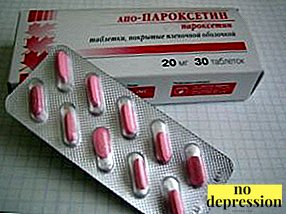 Antidepressants (drugs of this category normalize the production of certain hormones in the brain, in the treatment of endogenous depression can be used tricyclic antidepressants, serotonin selective reuptake inhibitors or monoamine oxidase inhibitors, Imipramine, Pirlindol, Paroxetine, Sertralin).
Antidepressants (drugs of this category normalize the production of certain hormones in the brain, in the treatment of endogenous depression can be used tricyclic antidepressants, serotonin selective reuptake inhibitors or monoamine oxidase inhibitors, Imipramine, Pirlindol, Paroxetine, Sertralin).- Preparations to stabilize mood patient (lithium).
- Medicines from the group antipsychotic (these funds eliminate aggression and relieve nervous agitation, Sonapaks, Aminazin, Droperidol).
- Anticonvulsant remedies (medications used to prevent nervous breakdowns, clonazepam, valproic acid).
- Drugs from the group antioxidants (The main purpose of using such remedies is to eliminate anxiety and suppress feelings of fear, Lorazepam).
- Using psychotherapy techniques (psychotherapeutic techniques are an integral part of the treatment of endogenous depression, cognitive, behavioral, family, individual, psychodynamic or interpersonal psychotherapy can be used).
Psychotherapeutic methods for the treatment of endogenous depression are selected individually.
Correct the course of therapy can only specialist. Additionally, patients are advised to follow several important rules.

First of all, you should work on your own consciousness.
We should not allow concentration on negative life factors, try to eliminate stressful situations and normalize sleep and wakefulness.
Examples of psychotherapeutic techniquesused in the treatment of endogenous depression:
- Psychodynamic correction program based on introspection.
- Cognitive, behavioral, or cognitive-behavioral psychotherapy (correction of the patient’s perception of the world, development of self-control skills and acquisition of social competence).
- Existential therapy (the main goal of this technique is to increase patient self-esteem and awareness of life values).
- Interpersonal psychotherapy (some social skills with endogenous depression are largely impaired, the purpose of this technique is to restore them in a patient).
Forecast
Endogenous depression is incurable? Projections for endogenous depression are directly dependent. from the timeliness and correctness of the course of therapy.
This type of mental disorder is among the most intractable conditions.
Get rid completely from the tendency to depression will not work. If this diagnosis is confirmed, the patient will always be at risk. A favorable prognosis is possible with timely relief of depression and proper prophylaxis.
Timely therapy allows the following forecasts:
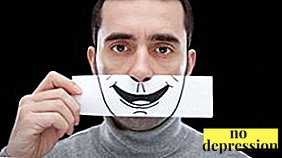 there will be a significant improvement in the patient's psycho-emotional state;
there will be a significant improvement in the patient's psycho-emotional state;- periods of exacerbation of depression will be reduced, and the period of remission will increase;
- it will be possible to avoid complications associated with the manifestation of depression;
- symptoms of mental disorder will decrease.
Prevention
Preventive measures to prevent endogenous depression are recommended not only for patients with a confirmed diagnosis, but also those at risk (genetic predisposition, certain traits of character, etc.).
Timely elimination of factors that can trigger this mental disorder will help eliminate complications and improve the quality of life.
The measures to prevent endogenous depression include the following recommendations:
- respect for sleep and rest;
- sufficient physical activity;
- prevent excessive mental stress;
- the exclusion of vigorous activity at night;
- good night's sleep;
- the exclusion of focusing on negative factors;
- antidepressants with a tendency to depression;
- dietary control;
- rejection of bad habits;
- exclusion of excessive mental stress.

Depression is severe mental disorderwhich can cause the loss of domestic and professional skills of a person.
This condition must be eliminated.
Otherwise, complications may occur. life threatening. People prone to depression are able to attempt suicidal acts.

 Antidepressants (drugs of this category normalize the production of certain hormones in the brain, in the treatment of endogenous depression can be used tricyclic antidepressants, serotonin selective reuptake inhibitors or monoamine oxidase inhibitors, Imipramine, Pirlindol, Paroxetine, Sertralin).
Antidepressants (drugs of this category normalize the production of certain hormones in the brain, in the treatment of endogenous depression can be used tricyclic antidepressants, serotonin selective reuptake inhibitors or monoamine oxidase inhibitors, Imipramine, Pirlindol, Paroxetine, Sertralin). there will be a significant improvement in the patient's psycho-emotional state;
there will be a significant improvement in the patient's psycho-emotional state;